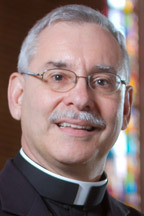
Bishop Anthony B. Taylor delivered this homily Oct. 12.
It is very disconcerting to discover that things are not as they appear. The beautiful looking orange that is all dried up inside. The car that had been ranked highly by Consumer Reports that turned out to be a lemon. And this can go way beyond just being disappointed in our expectations. The role model — coach, teacher or priest — who has many good qualities, but some secret fatal flaw that goes way beyond just having clay feet.
Have you ever been let down badly by someone you really admired, maybe even scandalized to learn shocking things that you would never have suspected? Something about a family member or someone else whom you thought you knew really well? Maybe one of your colleagues at work or one of your schoolmates whom everyone likes, but as it turns out, is into something really bad?
For that matter, it’s enough to look at ourselves: Don’t we all try to put our best foot forward, so that others will accept us and even admire us, even though we know there are things we have done that we’re ashamed of? They may not even be huge things and it may have been a long time ago, but still we’re very remorseful, will never do it again and would be mortified if anyone ever found out — and there’s no reason to tell anyone. The question is, are you now the person you appear to be to others or at least trying to be that person? “Fake it until you make it” is a good strategy only so long as you’re really trying to head in the right direction.
In today’s Gospel we have two parables, both of which have to do with living lives of integrity, in which our motives and actions really are consistent with who we say we are. For a Christian, that means living a life that truly corresponds to the Kingdom of God into which we were initiated at baptism.
In the first parable, that of the wedding banquet, Jesus’ adversaries reject God’s invitation to participate in the banquet — the life of the Kingdom of God. These were decent, religious people, very respectable on the outside, but dried up on the inside. Kind of like that orange. Their hearts were closed to the possibility that God might ask something of them that was unexpected and even unpopular.
Their refusal creates an opening for us: Access to the Kingdom for those who up to now had been excluded, those who had not been raised in the faith of Israel. That’s us, the gentiles!
But then we have something very surprising in the second parable, that of the wedding garment, which is about the guest who arrived not properly dressed. Surprising because this guy had just been drug in off the street; how was he supposed to get a wedding garment? Hadn’t the master just said to drag in everyone they could find, good and bad alike? But what Jesus is talking about now is the fact that once he has gathered us to himself, he then expects us to make his values our own.
That white garment with which we were dressed on the day of our baptism is the wedding garment of the Kingdom of God, whereby we put on Christ and this obligates us now to live lives consistent with the values of the Kingdom of God.
Those who say they are Christians but live like pagans are excluded. They are like the man not properly dressed for the banquet. His punishment was to be “bound hand and feet and cast out into the darkness outside, where there will be wailing and grinding of teeth.”
Notice that Jesus’ message here is very serious. His invitation is very generous, but he’s not playing games: He also punishes.
God offers us free admittance into the Kingdom of God, regardless of whether our past was bad or good, regardless of whether we were raised in the faith or not, but in order to remain in that Kingdom, he demands of us a life of integrity. That we truly be who we say we are.
Please read our Comments Policy before posting.
Article comments powered by Disqus Don’t sign new abortion petition, Bishop Taylor asks
Don’t sign new abortion petition, Bishop Taylor asks
 Bishop says Hot Springs priest taking leave of absence
Bishop says Hot Springs priest taking leave of absence
 Relationship with God first, vocation is second
Relationship with God first, vocation is second
 Tyler bishop says he will not resign from Texas diocese
Tyler bishop says he will not resign from Texas diocese
 10 things to know about upcoming Synod on Synodality
10 things to know about upcoming Synod on Synodality
 New season of ‘The Chosen’ delayed on streaming sites
New season of ‘The Chosen’ delayed on streaming sites
 Father Keller, oldest diocesan priest, a pro-life champion
Father Keller, oldest diocesan priest, a pro-life champion
 Vatican says abortion, surrogacy attack human dignity
Vatican says abortion, surrogacy attack human dignity
 Iowa basketball superstar supported by Catholic faith
Iowa basketball superstar supported by Catholic faith
 A Catholic You Want to Know: Joan Becker
A Catholic You Want to Know: Joan Becker
 St. Joseph a model of solidarity with immigrants
St. Joseph a model of solidarity with immigrants
 Two gifts after Jesus’ death: Virgin Mary and Eucharist
Two gifts after Jesus’ death: Virgin Mary and Eucharist
 Why we have an altar, and not just a communion table
Why we have an altar, and not just a communion table
 Pope: Wars should be resolved through nonviolence
Pope: Wars should be resolved through nonviolence
 Living relationship with Jesus Christ in the Eucharist
Living relationship with Jesus Christ in the Eucharist